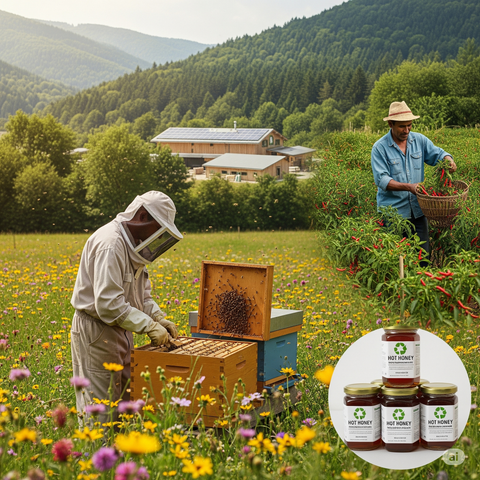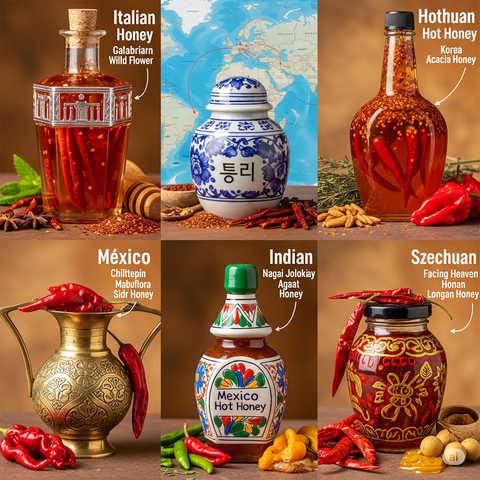Hot honey isn’t just a sweet and spicy addition to your favourite dishes—it’s a product rooted in the natural world. With honey coming straight from hardworking bees and the fiery heat of chillies grown on farms, the production of hot honey relies heavily on healthy ecosystems and responsible farming practices. But as demand for hot honey grows, so does the responsibility to produce it sustainably.
Sustainability in hot honey production goes beyond simply protecting the environment. It’s about ensuring the health of bee populations, supporting farming communities, and reducing the industry’s overall ecological footprint. Here’s why sustainable practices in honey and chilli farming are so important—and how they benefit everyone involved, from farmers to customers.
The Vital Role of Bees in Hot Honey
Bees as Nature’s Heroes
Bees are essential to producing honey, of course, but their impact stretches far beyond that. These tiny pollinators play a critical role in maintaining ecosystems by pollinating plants, including many of the crops humans rely on for food. Without bees, agriculture would look very different, and the planet would lose a significant part of its biodiversity.
For hot honey producers, bees are the unsung heroes of the product. Quality hot honey starts with excellent honey—and that comes from thriving, healthy bee colonies.
The Threats Facing Bees
Unfortunately, bee populations are declining at alarming rates around the world. Habitat destruction, pesticide use, climate change, and diseases are all contributing factors to what's known as Colony Collapse Disorder (CCD). This not only threatens the availability of honey but also jeopardises the global food supply.
Sustainable honey production must prioritise the protection and wellbeing of bees. Practices such as maintaining wildflower-rich habitats, minimising pesticide use, and supporting local beekeepers can have a direct positive impact on bee populations.
Sustainable Beekeeping Practices
Ethical hot honey producers partner with beekeepers who value sustainable practices. This includes providing hives with diverse forage, practising selective harvesting to leave enough honey for the bees, and avoiding chemical treatments whenever possible. Supporting responsible beekeeping ensures that honey production doesn’t come at the cost of the bees themselves.
Sustainable Chilli Farming
The Environmental Impact of Large-Scale Farming
Chilli peppers bring the fiery kick to hot honey, but how they’re farmed makes a huge difference to the environment. Large-scale farming often relies on heavy pesticide use, over-irrigation, and monoculture (growing a single crop repeatedly on the same land). These practices can deplete soil nutrients, increase greenhouse gas emissions, and harm surrounding ecosystems.
For example, over-irrigating chilli crops in water-scarce regions can lead to water shortages for local communities and wildlife. Meanwhile, monoculture farming can strip the land of vital nutrients, making it harder to grow future crops without heavy chemical intervention.
Supporting Sustainable Practices
Ethical chilli farming focuses on practices that are better for the planet. This includes crop rotation to preserve soil health, using natural pest-control methods, and adopting water-efficient irrigation systems. Some farmers are also experimenting with agroforestry, a technique that integrates trees and shrubs into farms to promote biodiversity and shade-sensitive plants, like chillies.
Sourcing chillies from farms that prioritise sustainable methods helps reduce the environmental impact of hot honey production while supporting farmers who care about the health of their land.
Fair Treatment for Farmers
Sustainability isn’t just about environmental protection—it’s also about people. Many of the world’s chilli farmers operate in developing regions, where labour rights and fair wages are critical issues. Sustainable practices include paying fair prices, providing safe working conditions, and fostering long-term partnerships with farming communities.
When producers invest in ethical chilli sourcing, they contribute to the wellbeing of farmers and their families, empowering them to continue growing high-quality chillies for generations to come.
Fighting Climate Change in Hot Honey Production
Reducing Carbon Footprints
Like many other industries, hot honey production has its own carbon footprint. Transporting honey and chillies, operating equipment on farms, and packaging products all contribute to greenhouse gas emissions. Producers committed to sustainability work to minimise these environmental impacts through smarter production processes.
Steps like sourcing ingredients locally, using renewable energy on farms, and opting for eco-friendly packaging materials can all reduce the carbon footprint of hot honey. Additionally, some forward-thinking companies are taking part in carbon offsetting programmes, such as planting trees to balance out their emissions.
Adapting to a Changing Climate
Climate change presents direct challenges for both honey and chilli production. Warming temperatures, shifting rainfall patterns, and more frequent extreme weather events can all affect crop yields and bee behaviour. Sustainable farming practices aren’t just good for the planet—they also help farmers and beekeepers adapt to these changes.
For instance, planting drought-resistant chilli varieties, providing additional water sources for bees, and preserving diverse agricultural landscapes can help ensure that hot honey production thrives even in a changing climate.
What Can Consumers Do?
Choose Sustainable Hot Honey Brands
One of the simplest ways to support sustainability in hot honey production is to choose brands that prioritise ethical practices. Look for producers who partner with responsible farmers and beekeepers, commit to reducing their environmental impact, and are transparent about their processes.
When you buy sustainable hot honey, you’re not just enjoying a delicious product—you’re also making a positive difference for the environment and the communities behind it.
Support Local Producers
Shopping locally reduces the environmental costs associated with transporting products over long distances. Many local beekeepers and small-scale chilli farmers produce hot honey with care and dedication. By supporting these producers, you’re contributing to more sustainable food systems in your own community.
Spread the Word
Help spread awareness about the importance of sustainability in hot honey production. Whether it’s sharing information on social media, talking to friends and family, or reaching out to local producers, your voice can make a big difference. The more people demand sustainable practices, the more likely the industry is to adopt them.
Wrapping It Up
Sustainability in hot honey production isn’t just a buzzword—it’s a necessity. From protecting bees and their vital role in the ecosystem to promoting ethical farming practices for chillies, responsible production benefits the planet, farming communities, and consumers alike.
As hot honey continues to grow in popularity, now is the time for producers and consumers to commit to sustainability. Whether you’re drizzling hot honey over your pizza or stirring it into your tea, you can feel good knowing your favourite condiment is helping to create a better future for all.




